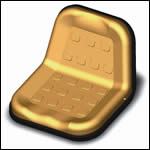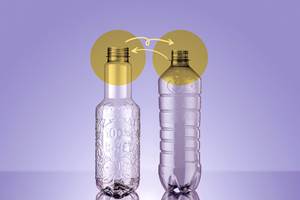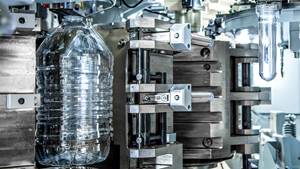Plastic-Metal Hybrids Are Now Blow Molded
Bayer Polymers has developed a blow molding technology that is putting new bounce into shock-absorbent seating for motorcycles, snowmobiles, tractors and off-road vehicles.
Bayer Polymers has developed a blow molding technology that is putting new bounce into shock-absorbent seating for motorcycles, snowmobiles, tractors and off-road vehicles. Bayer has a patent-pending process for extrusion blow molding flexible thermoplastic polyurethane (TPU) over and through holes in aluminum or steel inserts. This creates one-piece, soft/hard plastic-metal hybrid (PMH) structures that boost the cost-performance of non-automotive seats.
Bayer’s seat concept integrates a multi-compartment TPU air bladder with a rigid base or seat pan. In place of metal, the rigid insert could be made out of nylon 6 or 66 or PC/polyester alloys.
“This approach extends our capability to soft-on-hard blow molded PMH parts,” says Chris Cooper, senior processing engineer and co-inventor of the new process. Bayer already leads in technology for rigid-on-rigid PMH parts made by injection molding glass-reinforced nylon over metal inserts and through holes in the inserts to create button-like interlocks. These hybrids are widely used in car and truck front ends, radiator grilles, brake pedals, and oil pans. TPU blow molded hybrids improve seat performance and reduce overall cost relative to existing methods for making shock-resistant seating, says Gerry DiBattista, Bayer’s market manager and the other co-inventor of the process. Current seating utilizes cut-prone PVC skin bladders, foam- or gel-filled pads, and other cushioning methods that involve complex, time-consuming assembly steps.
“TPU bladders provide cushioning that combines high durability and design flexibility,” adds DiBattista. The materials bring excellent resistance to air permeation, puncture, and attack by various chemicals, plus low-temperature flexibility and ability to reuse scrap. Both rigid and flexible components of the hybrids can be designed to increase parts consolidation and eliminate manufacturing steps, DiBattista adds. He cites the ability to integrate drainage holes, adjustment devices, pressure valves, molded-in cup-holders, and other features. The method supplements polyurethane foam seating also offered by Bayer.
Molding hybrid seats
Bayer’s TPU blow molding hybrid technology begins with a robot that places a rigid metal or plastic insert in the blow mold. Inserts have specially designed hole patterns stamped or molded into them. An accumulator-head extrusion blow molding machine then drops a parison into the tool. Then the tool is closed and normal air pressure is applied to mold the TPU bladder. Molten TPU is forced through the holes, creating button-like features that secure the soft and hard segments. Buttons are formed by TPU penetrating the holes, mushrooming on exit from holes then freezing on contact with the cold tool wall.
Bayer demonstrated the holding strength of those buttons in tests of an 18 x 18 in. PMH seat. The hold strength averaged 43.5 lb, and failure typically involved “pull-through” of the buttons through elastic deformation rather than mechanical tearing or collapse.
Blow molding of TPU bladder compartments creates adjustable compression zones in the seat. Bladders may be permanently sealed or can instead include a welded-on or molded-in air valve. TPU bladders may be colored to match or complement the color of the rigid inserts and are easy to decorate.
Bayer recommends its Texin 985U grade of TPU for PMH seating. This is an aromatic polyether-based resin with 85 Shore A hardness. Bayer is also exploring use of polyester and aliphatic TPUs in various soft-hard PMH applications.
Broad potential seen
“The immediate opportunity for TPU blow molded hybrids is cushioned seating, but the potential will go further,” says DiBattista. Targeted end-uses include seating for lawn and garden equipment, agricultural vehicles, personal watercraft, mopeds, and other off-road vehicles. Easy cleaning of TPU surfaces is a hygienic benefit for wheelchair seating.
Additional promising applications are bicycle and motorcycle seats, as well as stadium seats and portable seats that are increasingly popular at sports and entertainment events. In automotive markets, TPU blow molded hybrids have potential in arm and headrests, bucket seats, and lumbar supports.
Bayer is also investigating a rigid-rigid PMH concept for blow molding large load-bearing automotive parts—ducts, crossbeams, and even instrument panels. The approach would involve a metal insert overmolded with glass-reinforced nylon. A developmental project involves integration of a metal crossbeam and air duct into a multi-functional PMH part.
Related Content
For Extrusion and Injection-Blow Molders, Numerous Upgrades in Machines and Services
Uniloy is revising its machinery lines across the board and strengthening after-sales services in tooling maintenance, spare parts and tech service.
Read MoreFaster Neck Changes Add Flexibility to Aseptic PET Blow Molding
KHS machines now can change neck sizes and associated components in one-third the former time.
Read MoreNew Bottle Base for Nitrogen-Dosed Products in 100% rPET
Sidel’s new StarLITE-R Nitro offers an alternative to petaloid bases with equal performance in a wide range of 100% rPET bottle sizes.
Read More‘Ultrafast’ Machine for Large PET Bottles
Sidel’s new EvoBLOW XL stretch blow molder makes up to 10 L PET bottles at up to 18,000 bph.
Read MoreRead Next
Beyond Prototypes: 8 Ways the Plastics Industry Is Using 3D Printing
Plastics processors are finding applications for 3D printing around the plant and across the supply chain. Here are 8 examples to look for at NPE2024.
Read MoreLead the Conversation, Change the Conversation
Coverage of single-use plastics can be both misleading and demoralizing. Here are 10 tips for changing the perception of the plastics industry at your company and in your community.
Read More





















